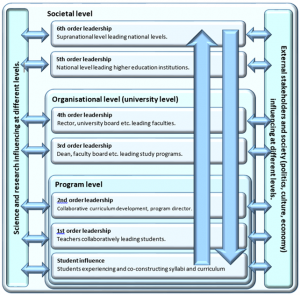This project intends to contribute to a Bildung centered language of HE leadership, grounded in education theory. This is considered a productive alternative both to neo-liberal policies introduced after 1991, and existing leadership theories. More generally, the transformation of Western societies from an industrial economy to a knowledge economy has contributed to a shift in the view on higher education (HE), from being the autonomous critical voice in a democratic society, to increasingly seeing HE as an instrument for innovation and economic competitiveness. Such efficiency oriented policies however, hinders HE leadership to pedagogically operate in critical, counteracting and non-affirmative ways that constitute the essence of the modern Western university tradition.
This sub-project critically reviews the state of the art in HE leadership applying Non Affirmative Theory of Education (NAT) as a theoretical framework. NAT is capable of dealing with the multi-level and multi-actor phenomena of HE leadership in a coherent manner. Also, NAT allows us to explore how the scope of pedagogical action at each level of leadership is framed or staged by the other levels, as well as how actors at different levels maintain and utilize their degrees of freedom.
The curricular development in HE is done in the tension between science, economy, politics and culture. In a globalised world, the leadership of HE can be understood as a multi-level phenomenon, ranging from the supranational level down to the individual teacher and student. Supranational actors, such as the OECD, World Bank, Unesco, World Economic Forum etc. actively strive to influence higher education. HE institutions, however, are framed in a national context meaning that different nation states interpret and respond differently to the supranational trends and initiatives. Based on these interpretations as well as national considerations, nation states frame the conditions for the national HE institutions e.g. through policies and funding mechanisms. Within these frames, HE organisations are lead at the university level, faculty level, department/program level down to the teacher and student level. As higher education is based on scientific research, it constantly balances between providing scientifically founded education on the one hand, and education with viability for society and the labour market on the other. HE leadership is visualised in figure 1 below.

Elo, J. & Uljens, M. (Eds.), (2024). Multi-level Pedagogical Leadership in Higher Education (Springer Open Access).
Elo, J. & Uljens, M. (2022). Theorising pedagogical dimensions of higher education leadership – a non-affirmative approach. Higher Education, 85, 1281–1298.
Uljens, M. & Elo, J. (2019). Reflecting refraction in higher education. In: P. Sikes & Y. Novakovic (Eds.), Storying the public intellectual. Commentaries on the impact and influence of the work of Ivor Goodson (pp. 119-130). London: Routledge.